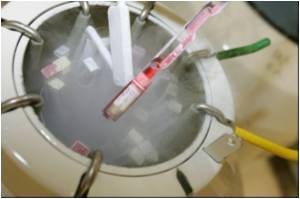A new research has uncovered the cause of 'unexplained infertility,' providing fresh hope to couples with the condition.

Carried out by Professor Sheena Lewis from the School of Medicine, Dentistry and Biomedical Sciences at Queen's, the new research reveals 80 per cent of couples with unexplained or idiopathic infertility in the large study of 239 couples have a detectable cause known as high sperm DNA damage.
The new study is the first of its kind and will lead to better treatment for these couples, saving them time, money and heartache.
"The majority of couples experiencing problems with fertility are able to receive an explanation for their infertility. These causes range from low sperm count, poor sperm motility in the man to blocked fallopian tubes or endometriosis in the woman. Once the causes for infertility have been established the appropriate course of assisted conception treatment can be undertaken," Professor Lewis said.
"For almost one third of couples, until now, there has been no obvious cause for infertility and these couples are given the diagnosis of 'unexplained fertility," she stated.
These couples often invest a lot of time and money in fertility treatments like intrauterine insemination (IUI) unlikely to be successful, she revealed.
Advertisement
The study also showed that the chances of having a baby after IVF is closely related to the amount of DNA damage a man has in each of his sperm. A little damage is normal (under 15 per cent per sperm), as is seen in the sperm of fertile men. But if the damage reaches clinically important levels (high sperm DNA damage more than 25 per cent per sperm) it will reduce the couples' chances of a family, even with some forms of fertility treatment.
Advertisement
"With one million couples worldwide requiring fertility treatment, these new research findings will give many fresh hope of having a family," Professor Lewis noted.
The finding was published in Reproductive Biomedicine Online.
Source-ANI









